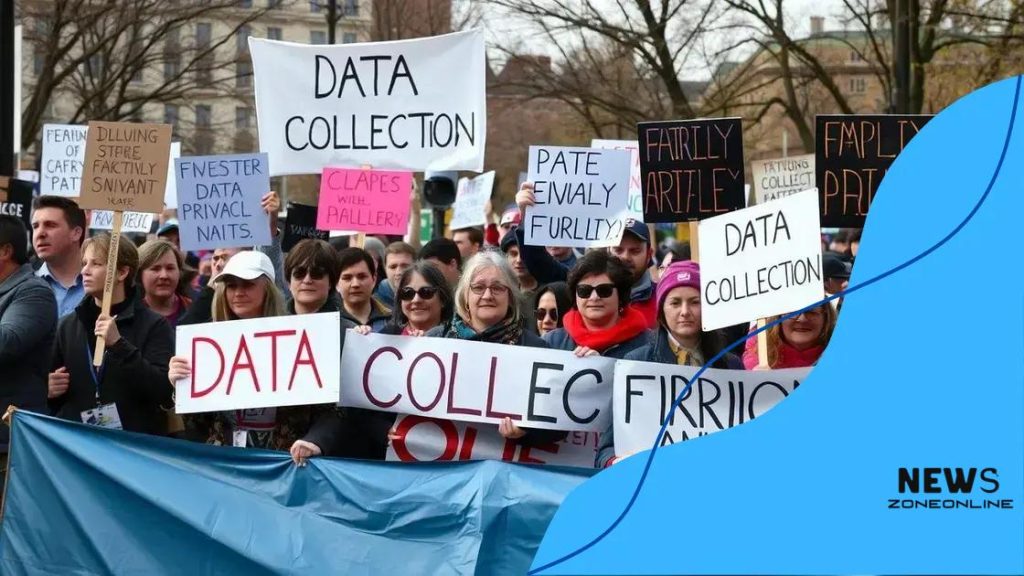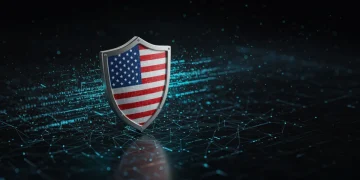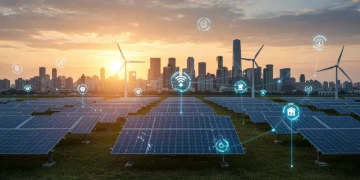Protester data collection controversy raises serious concerns

The protester data collection controversy highlights significant privacy concerns, as surveillance technologies and practices can threaten individual rights and freedoms during activism, necessitating stronger protections and ethical guidelines.
The protester data collection controversy has stirred up significant debate around privacy and civil liberties. As more protests take place globally, questions about how data is collected and used are becoming increasingly urgent. What does this mean for your rights and privacy?
Understanding the protester data collection controversy
Understanding the protester data collection controversy is essential for grasping the ongoing debates about privacy and civil rights. As protests become a common means of expression, the way data is gathered on protesters has raised vital questions. People are concerned about their personal information being collected and misused.
What is Data Collection?
Data collection refers to the process of gathering information from various sources. In the context of protests, data collection can include monitoring social media, tracking mobile devices, and using surveillance cameras. This practice can pose a threat to individual privacy.
Key Issues in the Controversy
- Privacy violations: Many individuals feel that their privacy is at risk when data is collected without their consent.
- Surveillance state: The extensive use of data collection can lead to a feeling of being constantly watched.
- Misuse of data: Information gathered during protests can be used against individuals, potentially leading to legal consequences.
There are various opinions on how data collection should be handled. Some advocate for increased transparency and regulations to protect individual rights. Others argue that data collection is necessary for maintaining public safety and order during protests. Finding the right balance is crucial.
Impact on Activism
The protester data collection controversy affects how individuals participate in activism. Some may choose to stay silent or reduce their visibility out of fear that their data will be tracked. This can weaken movements and the collective voice that protests aim to amplify.
Ultimately, understanding these dynamics is vital for everyone involved in civil discourse. Knowledge of how data collection impacts our rights can help individuals make informed choices about their participation in protests and activism.
Key players involved in data collection
Key players involved in data collection during protests include various organizations, technology companies, and government entities. Understanding their roles can help clarify the complexities behind data collection practices.
Law Enforcement Agencies
Law enforcement plays a significant role in collecting data during protests. They often use surveillance technology to monitor activities, track participants, and gather evidence. This raises questions about privacy and the ethical use of such data.
Private Technology Companies
Many private companies provide technology that facilitates data collection. For instance, social media platforms can track user activity and share data with third parties. This has sparked debates over how much control users have over their information.
- Data analytics firms: They analyze data to predict trends and behaviors.
- Surveillance technology providers: These companies supply cameras and monitoring systems.
- Telecommunications companies: They may share location data with law enforcement upon request.
Non-profit organizations also play an important role, advocating for transparency and ethical standards in data collection. They call attention to the risks associated with surveillance and the potential harms it can bring to activists.
Another group that is often overlooked are the protesters themselves. Many are becoming increasingly aware of their digital footprint and taking measures to protect their privacy. This includes using encrypted messaging apps and being cautious about what information they share online.
Ethical implications of surveillance practices

The ethical implications of surveillance practices in the context of protests are significant and complex. As technology improves, the ability for entities to monitor individuals has increased, leading to important discussions about privacy and civil rights.
Invasion of Privacy
One of the main concerns is the invasion of privacy. Surveillance can lead to a situation where individuals feel they are constantly watched, affecting their freedom to express opinions openly. This sense of being monitored can discourage people from participating in protests or voicing dissent.
Chilling Effect on Free Speech
Another significant concern is the chilling effect on free speech. When people know they are being recorded or watched, they may be less likely to engage in protests or express their views. This can harm democratic processes and limit public discourse.
- Fear of retaliation: Individuals might fear legal or social repercussions for their actions.
- Self-censorship: People could choose not to speak out on issues they feel strongly about.
- Suppression of dissent: Surveillance can be used by authorities to target activists.
Moreover, the use of data collected through surveillance raises ethical questions about consent. Many people are not aware that their actions are being monitored or how that data might be used. This lack of transparency can lead to distrust towards authorities and organizations.
Equally, there are discussions on whether the benefits of surveillance, such as ensuring public safety, justify the potential harms it can cause. Finding a balance between security and individual rights is crucial in addressing these ethical dilemmas. As society navigates these complex issues, it is important to engage in thoughtful dialogue about the use of surveillance technology.
Case studies of data misuse against activists
Case studies of data misuse against activists highlight the real-world consequences of surveillance practices. These incidents showcase how data collected during protests can be used negatively, affecting individuals and movements alike.
Example 1: The ACLU and Protest Monitoring
The American Civil Liberties Union (ACLU) documented cases where law enforcement agencies used social media data to track activists. This led to individuals being arrested based on their online activities rather than any actual wrongdoing. Such misuse of data raises serious civil rights concerns.
Example 2: The Black Lives Matter Movement
During the Black Lives Matter protests, data collection was prevalent. Some activists found that their personal information had been shared with police departments by tech companies, which caused fear among participants. Many felt that their right to protest was compromised by the risk of data misuse.
- Targeting individuals: Activists were singled out based on their social media posts or attendance at protests.
- Legal actions: Some activists faced legal repercussions due to data leaks.
- Retaliation: There are reports of protesters being harassed or intimidated after their data was exposed.
Additionally, there are cases where local governments used facial recognition technology at protests. This technology has been criticized for inaccurately identifying individuals, often targeting innocent people. These practices not only threaten individual privacy but also undermine collective movements.
Such case studies underscore the importance of scrutinizing how data is collected and used, especially concerning activism. They reveal the potential dangers of unchecked surveillance and emphasize the need for robust protections for individuals participating in protests.
Future of data privacy in protest conditions
The future of data privacy in protest conditions is a growing concern as technology evolves. With advancements in surveillance and data collection methods, it is crucial to consider how these changes will impact the rights of protesters.
Emerging Technologies
New technologies such as facial recognition and artificial intelligence are becoming more prevalent in monitoring protests. While these technologies can aid law enforcement, they raise significant privacy issues. The challenge is to balance safety with individual rights.
The Role of Legislation
Legislation will play a vital role in shaping the future of data privacy. Policymakers must create laws that protect individuals from unwarranted surveillance while allowing necessary security measures. Clear guidelines on data collection and usage must be established to safeguard activists’ rights.
- Stronger privacy laws: There is a push for laws that require consent before data can be collected.
- Transparency requirements: Companies and governments should be obligated to disclose how data is being used.
- Accountability mechanisms: There should be systems in place to hold organizations accountable for misuse of data.
Public awareness and education about data privacy rights are also essential. Activists and the general public should be informed about how their data might be collected and used. Understanding these issues can empower individuals to protect their privacy effectively.
As society continues to grapple with these challenges, it’s crucial to foster a dialogue among stakeholders, including technologists, activists, and lawmakers. This dialogue can lead to innovative solutions that respect both individual rights and public safety. The future of data privacy in protest conditions depends on our collective ability to navigate these complex issues.
FAQ – Frequently Asked Questions about Protester Data Collection and Privacy
Why is data privacy important during protests?
Data privacy is crucial during protests to protect individuals’ rights and freedom to express themselves without fear of being monitored or targeted.
What technologies are used for data collection in protests?
Technologies such as facial recognition, surveillance cameras, and social media monitoring are commonly used to collect data during protests.
How can activists protect their data privacy?
Activists can protect their data privacy by using encrypted communication tools, being mindful of their online presence, and understanding their rights.
What role do laws play in data privacy during protests?
Laws are essential in establishing guidelines for data collection and protecting individuals’ rights, ensuring that surveillance is conducted ethically and transparently.





